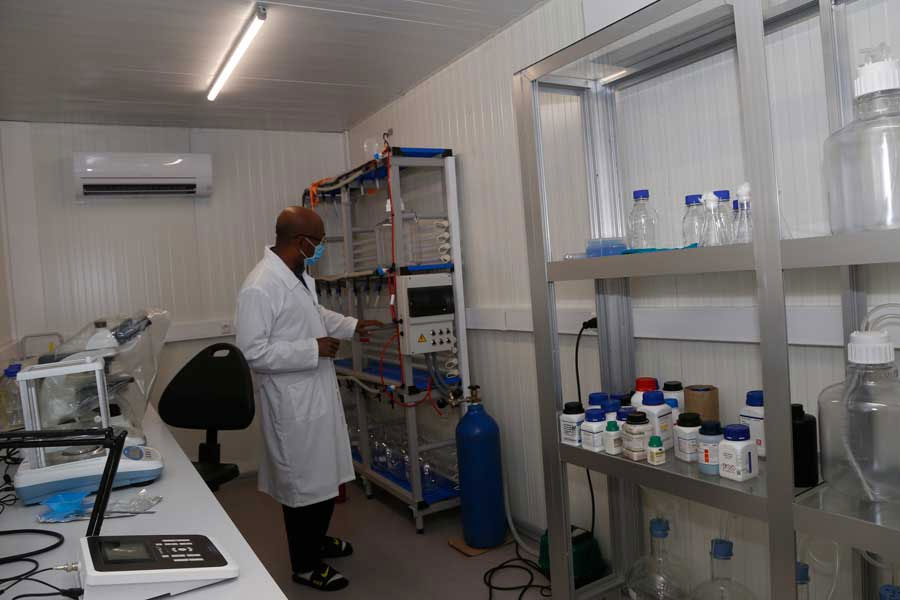
Radar | Apr 30,2021
Aug 7 , 2021
By Christian Tesfaye
The power of markets to bring people together cannot be underrated. Milton Friedman, famed economist, infamous if one is more left-leaning, once used the pencil to describe how markets bring people together from around the world. He took from an example utilised by Adam Smith on the division of labour to illustrate how no one person can make the pencil by themselves.
“The wood from which it’s made comes from a tree that was cut down in the state of Washington; to cut down that tree, it took a saw. To make the saw, it took steel. To make the steel, it took iron ore. This black centre, we call it lead but it’s really compressed graphite. I am not sure where it comes from but I think it comes from mines in South America.” he explains, holding a pencil in his hands. “This red top up here, eraser, a bit of rubber, probably comes from Malaya, where the rubber tree is not even native. It was imported from South America by some businessmen with the help of the British government. This brass ferrule, I haven’t the slightest idea where it came from, or the yellow paint, or the paint that made the black lines or the glue that holds it together.”
This was an upgrade to Adam Smith’s example on the production of pins. He explained, in his book “Wealth of Nations,” how 10 people can come together to produce tens of thousands of pins every day as long as they are engaged in specialised skills along the production value chain. What Friedman, who won the Nobel Prize in economics for his monetary stabilisation theory, does is make a political argument for it as well.
“Literally, thousands of people, cooperated to make this pencil,” he continued with his pencil example. “People who don’t speak the same language, who practice different religions, who might hate one another if they ever met. What brought them together and induced them to cooperate to make this pencil? There was no commissars sending out orders from some central office. It was the magic of the price system [channelling Hayek’s price signals here] . . . that brought them together and got them to cooperate to make this pencil so you could have it for a trifling sum.”
The pencil, sold at affordable prices, is a social good created out of economic cooperation. The whole process is not as historically non-violent as Friedman makes it sound. There is the extraction of economic resources from poor countries to wealthy ones, which throughout historical times has been conducted through means of violent colonialism. Even today, raw material exporting countries inevitably grow slower than industralised nations that are able to add value to each good. Raw materials, unless through more efficient means of extraction that brings down costs, or when there are the occasional shortages, have flat returns for the countries that export them. While value-added goods’ exporters see returns exponential growth as more sophisticated products sell for higher than their previous versions.
Still, this is a case for developing countries to invest in value addition and for a fairer and more just global economic order, not for doing away with markets, which can help the world produce social goods. It is the way to make affordable pencils, as well as transition successfully into green economies.
It is globalisation and improved living standards that have put a stamp on raging conflicts since World War II, although the United States and the United Nations take an oversized credit for this. Starved people and unemployed youth fight. Their frustration can easily be harnessed by opportunistic elites into weapons of distraction. We are not really at war between ourselves. They are just battles.
The war is with poverty, and Ethiopia, and Sub-Saharan Africa, have always been losers in this when they took their core focus away from it.
PUBLISHED ON
Aug 07,2021 [ VOL
22 , NO
1110]


Radar | Apr 30,2021

Fortune News | Nov 27,2021

Commentaries | Nov 29,2020

Radar | Dec 10,2018

Radar | Aug 17,2019

Radar | Nov 24,2024

Radar | May 11,2019

Fortune News | Apr 02,2022

Sunday with Eden | Dec 31,2022

Radar | Jun 05,2021

My Opinion | 131548 Views | Aug 14,2021

My Opinion | 127903 Views | Aug 21,2021

My Opinion | 125879 Views | Sep 10,2021

My Opinion | 123510 Views | Aug 07,2021

Dec 22 , 2024 . By TIZITA SHEWAFERAW
Charged with transforming colossal state-owned enterprises into modern and competitiv...

Aug 18 , 2024 . By AKSAH ITALO
Although predictable Yonas Zerihun's job in the ride-hailing service is not immune to...

Jul 28 , 2024 . By TIZITA SHEWAFERAW
Unhabitual, perhaps too many, Samuel Gebreyohannes, 38, used to occasionally enjoy a couple of beers at breakfast. However, he recently swit...

Jul 13 , 2024 . By AKSAH ITALO
Investors who rely on tractors, trucks, and field vehicles for commuting, transporting commodities, and f...

Jun 28 , 2025
Meseret Damtie, the assertive auditor general, has never been shy about naming names...

Jun 21 , 2025
A well-worn adage says, “Budget is not destiny, but it is direction.” Examining t...

Jun 14 , 2025
Yet again, the Horn of Africa is bracing for trouble. A region already frayed by wars...

Jun 7 , 2025
Few promises shine brighter in Addis Abeba than the pledge of a roof for every family...

Jun 29 , 2025
Addis Abeba's first rains have coincided with a sweeping rise in private school tuition, prompting the city's education...

Jun 29 , 2025 . By BEZAWIT HULUAGER
Central Bank Governor Mamo Mihretu claimed a bold reconfiguration of monetary policy...

Jun 29 , 2025 . By BEZAWIT HULUAGER
The federal government is betting on a sweeping overhaul of the driver licensing regi...

Jun 29 , 2025 . By NAHOM AYELE
Gadaa Bank has listed 1.2 million shares on the Ethiopian Securities Exchange (ESX),...